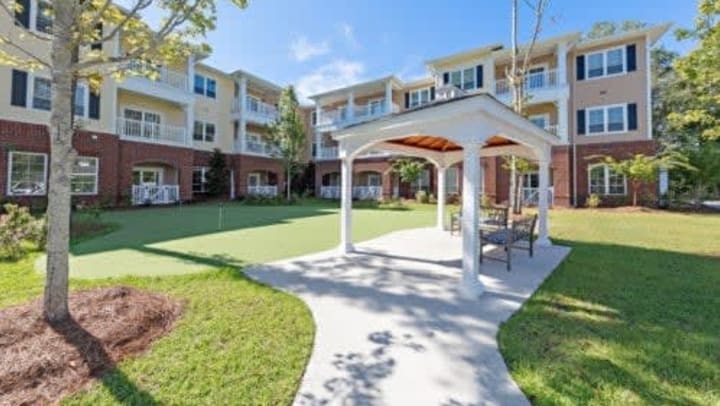The following article was originally published by Senior Housing News.
After more than a decade leading MBK Senior Living, Terry Howard started an advisory firm and was not looking to get back into operations — until Harmony Senior Services came calling.
Attracted in large part by the company’s integrated model — involving related private equity and development firms that work in concert with Harmony as the operator for ground-up projects — Howard took the CEO position and now is about two months into the job.
He will be helming a company in growth mode. Charleston, South Carolina-based Harmony has 11 communities under development, representing more than 1,400 units. Its existing portfolio encompasses nearly 30 communities across seven states. Howard has been touring these communities, gaining a “lay of the land” in order to help the provider manage its growth and carve out a strong market niche.
An efficient model
Harmony is a subsidiary of Roanoke, Virginia-based real estate developer Smith/Packett, which was founded by Jim Smith and is led by his son, President and Principal Hunter Smith. Jim Smith also created a private equity firm — Charleston, South Carolina-based Wessex Capital — which became a standalone entity from Smith/Packett in 2015, and which he still leads as chairman and CEO.
With Wessex securing the investor capital, Smith/Packett handling development and Harmony as the operator, the Smiths created an end-to-end platform for building new senior housing communities.
“I went to NIC, and a friend of mine mentioned that Harmony was seeking a CEO,” Howard told Senior Housing News. “I wasn’t really looking, but I talked to some associates in the industry, and they said, ‘These guys have a really efficient, interesting platform.’”
Howard took a meeting with the Smiths and formed an “instant connection,” he said. He was drawn to the alignment of interests between the finance, development and operating arms of the Smith’s businesses, as well as their expertise in creating a more financially accessible model of senior housing. Though he would not describe it as an “affordable” senior housing, Harmony is casting a wider net for residents than providers creating a luxury product.
“Part of the secret sauce on the development side is that Jim and Hunter have put together a very seasoned development team who have been doing this since 1982,” he said. “They build a very cost-efficient building, which allows us to pass that along to the consumer rather than being a high-end, high-rate provider.”
While he declined to share details about how these buildings are value engineered from a design and construction standpoint, part of the equation is in careful market selection. Harmony currently operates in Georgia, North Carolina, Pennsylvania, South Carolina, Tennessee, Virginia and West Virginia. And its projects tend to be large buildings of at least 170 units, located most frequently in secondary or tertiary markets rather than major metros such as Philadelphia or Atlanta. The company also offers a continuum of independent living, assisted living and memory care.
Harmony has experienced some pressure from the new supply that has hit the industry as a whole in the last few years, but Howard views the company’s position as favorable.
“When you go into a secondary market and build 180 doors, you’re in essence creating a barrier to entry, and I like that,” he said. “We’re not immune to the pressures of the industry, but we have seen [new supply] slow down, and I think it’s encouraging.”
First priorities
In terms of where Howard is focused in his first weeks and months as CEO, he’s still in an intelligence gathering mode. By visiting Harmony communities, he wants to get a clearer picture of the company’s offerings in each market, with regard to IL/AL/memory care split, unit size, amenities and consumer response. Some strengths have quickly emerged.
“Harmony really does a great job of delivering on the food service promise,” Howard said. “I’ve done taste tests and I’ve been impressed with the quality of food, presentation, layout of the dining area, how the food is delivered.”
Howard’s roots are in marketing — his is an alum of Columbia University’s Graduate School of Business/Executive Education Program for Marketing Management — and he’s impressed with this facet of Harmony’s operations. Chief Sales and Marketing Officer Luke Fannon brings a disciplined approach to determining consumers’ needs and collecting, analyzing and disseminating data, Howard said.
From an operations standpoint, Howard is interested in leveraging tech further to drive back-office processes and strategic decisions. But he is cautious about new resident-facing technology.
“I can’t recall over the last 10 years ever losing a resident to a competitor … because we didn’t have enough iPads,” he said. “But you can lose them because of your shortcomings in basic service offerings.”
With labor markets tight and an ongoing caregiver shortage, it’s no surprise that Howard is focused on how to improve in the area of hiring and retention.
“Like many operators, I think we’ve got opportunities to improve our hiring process, further minimize turnover, and really build and develop a stable environment as far as the operating team,” he said.
The current pricing model — which includes five care levels in assisted living — seems to have been well-received in the markets where Harmony operates, but this is another area that warrants close assessment in Howard’s view.
His time with MBK gave him operating chops and also honed his leadership style; he strives to be collaborative and transparent, he said, and to exercise his listening skills, especially early in his CEO tenure.
“I tend to ask more questions than give answers, at least in the first 30, 60, 90 days,” he said. “My goal is to develop a deep understanding [of Harmony], present that to leadership and then chart our course.”
(Link to original article here)


